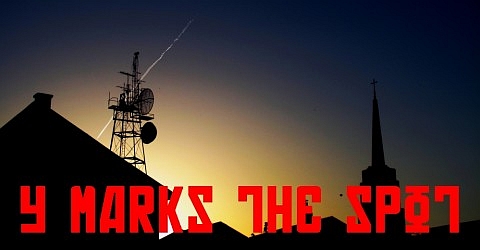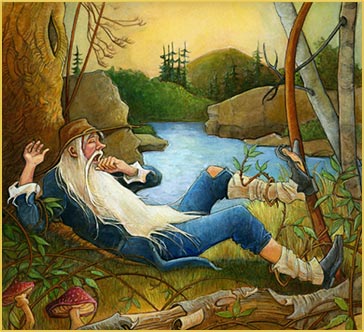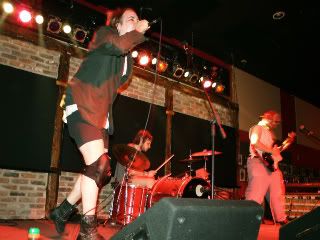
There was a great era in my life, between living in California and Washington, when my hometown of La Crosse, Wisconsin was amazing in ways it wasn’t before. I’ve lived in La Crosse for a total of 27 years, and for a majority of that time my hometown has bored me to tears. There’s a carefully crafted sense of belligerent apathy in La Crosse, an omnipresent boredom coupled with a refusal to do anything to erase that boredom. Don’t rock the boat, the apathy has always said. In La Crosse, this leads to a chicken and the egg question where I have to ask: is La Crosse boring because it’s drowning in alcohol, or is La Crosse drowning in alcohol because it’s boring and doesn’t know what else to do?
Whatever the answer may be, hail to the heroes who fight that apathy. In the four years of my return to La Crosse, I saw my hometown in a completely different light. This change wasn’t just in my head, though. In this era, there was a seething underground punk scene, the development of creative venues like the Root Note that weren’t just watering holes that incidentally played music over the fog, the renovation of River City Hobbies from a good comic book store into an amazing one, and the evolution of the Second Supper from an Onion also-ran into a weekly newspaper with gigantic balls. (Appropriately enough, the first Supper issue I read in the new style had a cover story about this story’s subject.) I wrote for the Supper for three of my four years back, and as a result I saw and did things I never expected I’d see or do in La Crosse. It was a time when I truly fell in love with my town like never before.
But like all things La Crosse, entropy and apathy reasserted themselves. Many of the upstarts were phased out or absorbed into the status quo. The Second Supper got bought out and completely lost its edge. It now has a fourth of the page count it boasted in its heyday, it comes out monthly instead of weekly, and the precious little material left isn’t much more than an events calendar and a syndicated advice column. The guys who all but ran the house show punk scene in La Crosse moved out to Washington, and knowing a sinking ship when I saw one, I moved out here with them. Here, I found improv comedy and stand-up scenes – two scenes which will almost certainly never take root in La Crosse – and now I can’t see myself ever coming home to stay.
It’s getting worse. Now, even the few old, fun institutions are fading. River City Hobbies recently closed following the death of owner and all-around amazing guy, John Vach, leaving La Crosse, a moderately sized city, completely without a comic book shop (and no, Barnes and Noble doesn’t count). Now, the Warehouse, which has for decades served as the stalwart enemy of La Crosse apathy and the city’s only music venue for people who aren’t into bar blues and jam bands, is days away from closure. Should this happen, La Crosse loses its only all-ages hangout for people who don’t want to be barraged with Jesus pamphlets, and La Crosse as a whole loses a vital part of its culture that never gets replaced.
Here’s what you can do to help. Go to Indiegogo’s “Warehouse Rescue Campaign” page. Donate anything. Share this with your friends. Tell everyone you know. Become the Girl Scout cookie entrepreneur you were always meant to be.
Because on August 23rd, it’s over. Done. And if the Warehouse doesn’t meet its goal, La Crosse, Wisconsin gets even more boring. To those of us from La Crosse, the Warehouse seems like it has always been around, but if you and I do nothing, it won’t be anymore.
THIS IS IMPORTANT. I dare you to give a shit.
Warehouse owner and all-around amazing guy, Steve Harm, recently talked to me about the details of the Warehouse’s financial woes, what he plans to do about it, and why he never regretted standing apart from the typical La Crosse apathy and creating something difficult and beautiful.
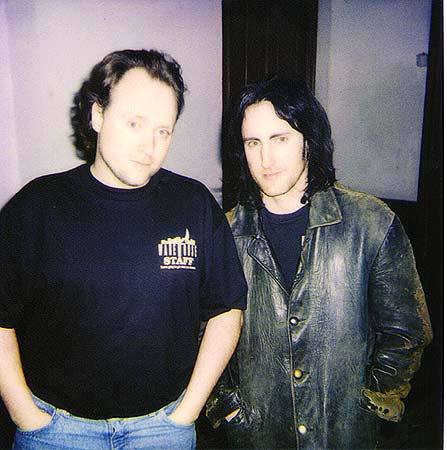
Warehouse owner Steve Harm, with Trent Reznor of Nine Inch Nails
Y Spy: So let’s start with the basic question: what’s the current fundraiser to save the Warehouse all about?
Steve Harm: Well, we have been successfully amassing a pretty serious amount of debt over the past 5 years, which really started when we got conned into buying the building next door by the tenant who quickly filed bankruptcy and took off leaving us with a huge amount of commercial space to rent. The original idea was that the 2nd building, a school of cosmetology, would fund the Warehouse. All ages no alcohol venues don’t survive as independent entities anywhere, but the Warehouse has always had the caveat of a first floor commercial tenant and 4 more band tenants in the building. That’s how we have squeaked by for 22 years.
But the guy who ran the beauty school approached me in late 2007 about buying the building he was in from the owner in Minneapolis. He was afraid that a local developer would buy it and move him out or seriously jack his rent. He offered us a solid 5 year lease, which meant we’d have consistent income for 5 years minimum, allowing us to have extra money each month (unheard of for the Warehouse) AND be able to put in new windows, upgrade the sound system, do a bunch of brickwork, etc. All we needed to do was take ALL of the equity that had been built up in the WH over the past 17 years, borrowing 100K more for roof work and electrical improvements and a new HVAC system for both floors, and we’d have that constant stream. Something we had never been able to count on. What could go wrong?
What went wrong was that the guy cleared out all the student loan deposits and tuitions from the school here and his school in Madison, ran to Florida, bought a house in the Florida Keys, and filed bankruptcy. Untouchable for us, leaving us 6 months into 2008 in the middle of the real estate bust, with a giant commercial building surrounded by a downtown full of empty buildings.
So our first plan was to try to find another school of cosmetology to move in. We spent a couple months cleaning and upgrading. We marketed the space to all of the cosmetology schools in Wisconsin, Minnesota, and Iowa, but in that economy, no one was biting. Selling that building has been problematic, because developers (the only people who would pay for commercial buildings right now) want to pay pennies on the dollar.
Y Spy: Are developers being cheap because of the downtown location and the cost of renovating old buildings, or is this just the general nature of the beast these days?
Harm: Developers are cheap because developers are efficient. At least until recently there has been a glut of property downtown. The City of La Crosse even added to the problem by building the Transit Center a block away, with 12000sq. ft. of commercial space available. So property owners were basically competing with the City to lease property, on a City-built property that we paid for.
On the fundraiser end, we’re trying to raise enough to pay off the property taxes, catch up on several months of mortgage payments and pay a little on the loan to get the payments down a little, pay off other various debt (contractors, city fees, state inspection fees, insurance, BMI, ASCAP, SESAC, water bills, accountant fees), replace some critical parts of the sound system, and do enough renovation work on the leasable space to make it more attractive so that it can again be what keeps the Warehouse running.
Y Spy: Have there been any other problems lately?
Harm: About 8-10 years ago, the payola practice of “buying” on to big tours for smaller bands started working its way down to smaller venues. It became normal for local bands in Minneapolis and Madison to have to buy $500-$750 worth of tickets to a show just to be able to play that show. That made things harder for us with agents, as Minneapolis or Madison could always offer substantially more for a tour, because they had $1500-$2500 to work with right out of the gate — they were taking no chances, they had guaranteed income from local bands. I would not, will not ever do that to local bands. Young bands have to pay for equipment, rehearsal spaces, vehicles, trailers, promotional materials, recordings… they should never have to pay to play.
Y Spy: Is touring for most bands even worth it, when practices like this are becoming the norm even at the ground floor?
Harm: No! It is getting SO hard for young bands. First, there are too many of them, and it is really easy to tour because of the internet. That is a problem. Pre-internet, it took at least a morsel of brains to put a tour together. Actually, it was a tremendous amount of work. Now, bands have it really easy. So that clogs the highways of America with vans and trailers. But because of the tremendous amount of bands, there are also a tremendous amount of shows. When we first started, the only places you could see all-ages shows in Wisconsin were in Green Bay at RockNRoll High School, in Milwaukee at the Rave, and at the Warehouse.
That was actually a GOOD thing, because it made every show an event, unique, special.
Y Spy: Now there’s a surplus of disposable labor.
Harm: Yes there certainly is. And they are all hungry to play, so all those hungry guys are chewing off their own legs by overplaying and not making shows an event.
Y Spy: Didn’t you have another recent fundraiser?
Harm: There was a fundraiser last year to help pay for our cabaret license. Those only cost around $125, but the City ties in a tax called the “Personal Property Tax” with it. The Personal Property tax is a tax on everything besides income. A tax on every chair, table, microphone, light, etc. etc. etc. It is not a very high percentage tax. Ours should be around $200. But you file it by April of the previous year, and if you miss the filing, they decide that you need to pay a “doomage”.
Y Spy: Sounds ominous.
Harm: We missed the filing 2 years in a row (my mistake), but on this year’s filing, we would normally owe around $200. The City billed us… hang on to your britches… $6,900. A penalty of almost THIRTY FIVE times the actual tax.
Y Spy: Wow. Do you feel like the city is trying to shut you down on purpose?
Harm: I tried to get the Assessor to come down on that $6,900, tried to get the City Attorney to intervene, nobody gives a shit. “It will be lower next year” was the best I could get. They did give me the option of “making payments,” but is making payments on something I should not have to pay really doing me a favor? I’ll bet you if any of the big players downtown made that filing mistake, the City would take care of it mighty quick. Me, I’m a nobody. I don’t show up at City Hall screaming, I don’t call the mayor and get something changed, I don’t have secret meetings with the old boys’ club. I work ridiculously hard, and so does everyone else here, to provide an alcohol free venue for kids that no one in this damn town will appreciate until it is gone. Like us here or not, no one ever fell in the river and drowned from too much music at the Warehouse.
Y Spy: This isn’t the first time people have gone after the Warehouse. The guy from Fayze’s, the lady running Jules, a few other locals, I’m sure ‒ you’ve racked up a few complaints over the years. I’ve always felt that La Crosse’s reaction to the Warehouse was never that different from the plot of Footloose. Those damn sinful kids and all that. “Why can’t they be satisfied with Crossfire?”
Harm: Yeah, we’ve been a pariah sometimes, but not really for any legit reason. I know Chris from Jules gets pissed when her all-day coffee customers can’t park on Pearl because we’ve got some band vans parked. But those band guys, and concert kids, get a lot of coffee there. Even when there is a tour bus parked out front, it does not deter people from going to Jules. If anything, it attracts some curious people who end up getting coffee. Fayze’s… I think that was a misunderstanding that we probably could have rectified with a more open discussion with the Wakeens. They’ve turned out to be some very nice people. But it turned into Footloose at a City Council meeting; that was actually kind of awesome. Yeah, I always hear about “the Warehouse Kids”, when they really mean “those Crossfire Kids”.
I don’t want to rip on Crossfire too much, I get that they are trying to save troubled kids with Jesus. And you know, if they can save troubled kids, I really don’t care HOW they do it. But that place got over $800,000 in renovation donations, plus most of the contractors worked for free. Have they had more effect on kids in this area than The Warehouse? Less? The same amount? Or the real question: Have they had a million dollars more of an effect?
Y Spy: But they have the Looooord! It is an unfair double standard, regardless of their intentions.
Harm: Yes it is. We get “Jesus” bands all the time, bands that preach at length during their set. As long as the kids aren’t booing, I don’t care. But I have a talk with them after the show. I tell them that instead of preaching to the kids from the stage, they would be better off setting a good example when they are meeting kids at the merch table or anywhere else in the Warehouse.
We are built on the most important part of Christianity ‒ treat people like you want to be treated. I think teaching kids that is more important than teaching them anything else. Everyone knows morals ‒ they are mostly inherent. But I always tell Christian bands that Christians are the ones who give Christianity a bad name, so try not to talk down to kids or force-feed them Bible verses. Instead, be good examples.
Y Spy: Is this desire to teach kids the reason you’ve never sold alcohol?
Harm: Well, not entirely. It is a MAJOR misconception that I hate alcohol. I don’t. I love a well-crafted small brewery beer. I just never have time and am perpetually so overworked that one beer will knock me on my ass. But La Crosse has a rich brewing tradition. Turn of the century, this town had more breweries per capita than Milwaukee. I understand where the drinking culture, and with it, the alcoholic culture, came from.
Kids are going to drink. It is unavoidable in this town.
Y Spy: The problem is that there’s little else to do in town but drink. And it makes La Crosse incredibly boring.
Harm: We just try to delay that for a few years by providing over a 100 sodas that are from all over the world, to show them there IS interesting stuff to drink out there. Australian root beer, for example. It’s delicious.
Y Spy: I had way more adventures before I started going to bars. I felt really boring once I started barhopping. The way they are used in La Crosse, bars really suck the joy and fun out of a place. Drinking in bars has a lot of ritual and habit to it, and I’d call La Crosse a town drowning in ritual and habit. Your place is one of the few places in town which goes against that.
Harm: Well I see that, because “Warehouse kids” invariably “grow up.” I see them hitting 21 (or 20, it seems anyone can get into bars downtown if they put a little effort into it). Some of the kids complain that they don’t see their friends anymore, because “everyone goes downtown”, but the reason everyone goes downtown is because everyone is going downtown. I understand the need to have a few drinks socially once in a while. But La Crosse… damn. Who exactly “has a few drinks” when they go out? They might DESCRIBE it that way.
Y Spy: Alcoholism created out of boredom and a lack of imagination and options.
Harm: And APATHY.
Y Spy: It’s so goddamn hard to get people to care about anything there. It’s why I left.
Harm: La Crosse has a great “arts” scene. Pump House, Community Theater/Weber Center for the Arts, Jason is giving is a go at the Cav, Root Note does some great shows for their clientele, Popcorn is always jamming with jam bands jamming their jams… and we do metal and acoustic and hip hop and rock and pop and punk and wrestling and freakshows and industrial and gothic and ska and such.
I expect that if we go down, some local bars will attempt Sunday or Monday night “teen nights”, maybe with bands. Those are always the worst idea ever, because they are designed to make those teens feel comfortable in that bar atmosphere specifically, so that when they hit 21, they know where they are going. I hate that bullshit. It is so obvious.
It will be interesting/embarrassing to see who the vultures are. That’s for sure. Who has the least class first. Because you know that someone is out there right now planning on capitalizing on our 22 years of ingraining booking agents with the knowledge that La Crosse is a good stopover, even if what they actually mean is that The Warehouse is a good stopover.
Y Spy: So financially, musically, and culturally, what would the Warehouse have been if it wasn’t an all ages venue and instead sold alcohol?
Harm: If we were a venue, but we had sold alcohol the entire time?
Y Spy: Yeah.
Harm: I don’t think we would have lasted. I think the supply of locals would have dried up, because that “drinking age” band would not have wanted to haul their gear up 49 steps. Not when they are already playing that week at the Popcorn, next week at Stein Haus, tomorrow at Del’s, then at JB’s. There would be no point to add one more location to their schedule, especially if it was up 3 flights of stairs. We’d probably have a way-above-average amount of customers going to the hospital from falling down the stairs drunk. That front door wouldn’t be glass anymore; it would be half metal like Top Shots. I just don’t know if it would have worked at all.
I know we would have had a hard time getting many of the bands we did, because many of them insist on an all-ages crowd. Bands aren’t dumb − they know who buys Tshirts and hoodies and shorts and, yes, sometimes music (vinyl these days): teenagers. Bands can tell you what it is like trying to get bar customers to part with $10 for a band shirt when they can get a $2 PBR instead.
Kids don’t come here to hang out. You can see that. They come to see bands. They are attentive. They WANT to see the band do what they do. Bands love it.
Y Spy: True. When I lived in California, shows were little more than a forum for preening, bored douchebags who have nothing else to do that night but be seen. I’ve always argued that kids in the sticks are way more excited about shows than people who can see amazing shows any day of the week in big cities.
Harm: Well, that’s another angle on our financial woes too. Let me explain.
As I lecture bands constantly, booking agents have gotten lazy. It used to be, 2 bands would go on tour; the local promoter could add 1 or 2 or 3 locals. Makes a great show, and local bands would get all their friends to come. They could do these shows in any sized market.
Now, agents put together 6,7,10 band shows that are so big and need so much money that it completely prevents the show from happening in small markets. Agents just run them through the same 30 promoters in major markets, and they no longer have to think about routing or secondary markets. This causes a hardship for us, because those 2 national band/3 local band shows can be house-fillers. And what is even worse for the national bands on those megatour packages is they end up only playing in major markets, where kids are going to see ANOTHER 10 band package next week, and another the week after, and that band who thought it was great to get on this “big” tour finds out they are just a cog in the machine.
Take the same band and run them through smaller markets, their shows are huge, because EVERY kid there loves them and becomes an honest-to-god fan, as opposed to the 10 band shows in major markets where they are just one more band of the 60 that played that month. BAD FOR EVERYONE.
Y Spy: Once again, nothing but disposable labor.
Harm: Yup. I explain that to bands who are on labels and are parts of those big tours; they don’t really get it. Then they play a Warehouse show, and they sell more merch per capita than ANY of the big shows. They sign more autographs. They even sell MUSIC. THEN, they get it.
Sometimes, I feel like we are a music school on so many different levels.
Y Spy: Well, and you’ve hosted actual courses on touring, too, with Martin Atkins.
How sheltered and insulated do touring bands get?
Harm: They definitely get into a routine. Just to back up and relate: If we can get this fundraiser to work, we are going to try to find a way to set up the Warehouse as a non-profit (my accountant already calls me “anti-profit”) and get access to various grants etc. that would let us bring in lots of national speakers like Martin Atkins, host monthly musician’s meetings, bring in musicians for music clinics (why have a guitar clinic at Dave’s when he could set it up here in a performance space), make the building available for local film students to shoot band performance videos, learn location recording, etc. I see a lot of expansion possible with reorganizing.
Y Spy: Nice. So not just treading water. How is the fundraiser going so far?
Harm: Definitely not treading water. With a more secure future, we should be able to do some really creative, beneficial things. The fundraiser is at $20,000 with a loooooooong way to go. But only until Aug 22. After that the bank is going to come down on me with a furious wrath.
Y Spy: So it’s pretty much do or die?
Harm: It is definitely do or die. It was “die” when I walked out of the last bank meeting. To tell you the truth, we started this fundraiser to throw a wrench in the machinery because that was the only option other than handing over the keys. The bank has backed off, because they are watching this to see what kind of support we get.
Miracles have happened in the past couple months. [Refers to articles discussing Jack White and The Killers donating hundreds of thousands of dollars to save hometown venues.]
Y Spy: Any ideas for provoking said miracles?
Harm: Last night I wrote to NIN’s manager, a friend who sets up the piano every night for Elton John, and Fall Out Boy’s manager for the third time. The tough thing is actually getting through to these people. There are thousands of people in the entertainment industry for whom the entire amount of our fundraiser would be a throwaway for them, no sweat at all. But regardless of how it seems like people use twitter or facebook, when they are at that level, they have people managing their social networks. The level of insulation between common folk and Robert Downey Jr., for example, is astounding. So just getting one of those people to read a letter or look at a video is damn near impossible. But I see kids who are posting on pages every day that I never would have thought of. And I think that kind of appeal, from kids who come here, is really important.
I am hoping that 22 years of treating bands fairly will generate enough karma. If I was not an eternal optimist, I sure as hell wouldn’t have been here living day to day for 22 years, fighting bill collectors, tax collectors, and the Man. I always have hope.
I will maintain that hope until 11:59pm, August 22nd. Then, we shall all watch the vultures.
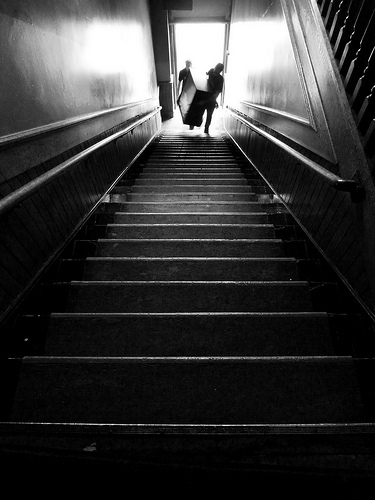
Please Help. Donate anything. Spread the word. On August 23rd, one way or another, this ends.
August 11, 2013
Categories: Music Q&A, Y Spy . Tags: La Crosse, Wisconsin . Author: Y . Comments: Leave a comment
